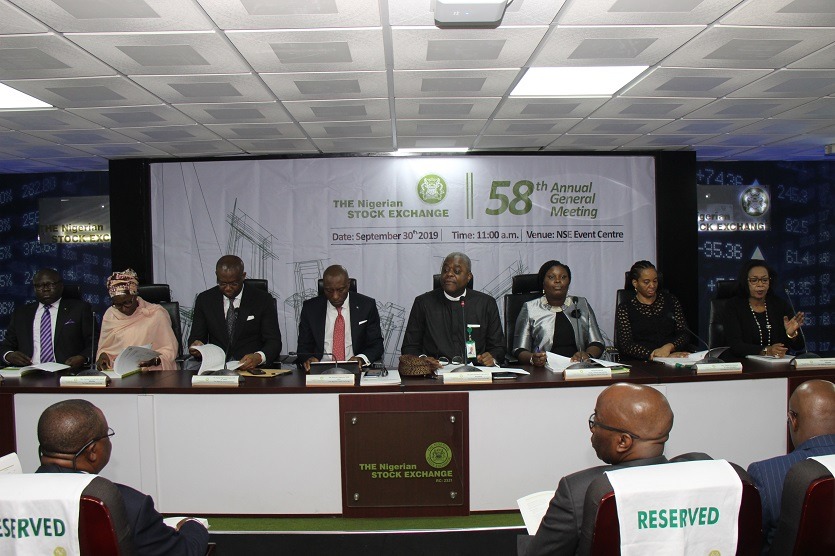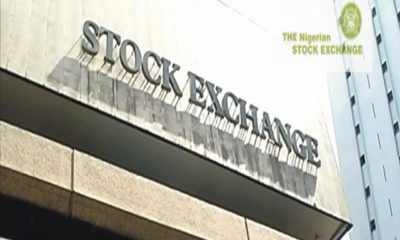- NSE Reports N2.70b Surplus for 2018
The Nigerian Stock Exchange (NSE) on Tuesday reported N2.7 billion surplus for the year ended December 31, 2018.
The bourse disclosed this at the 58th Annual General Meeting (AGM) held on Monday 30, 2019 at the NSE Event centre in Lagos.
Mr. Oscar N. Onyema, OON, the CEO, NSE, said despite the tough operating environment, the exchange closed the year with a surplus of N2.7 billion.
“Total revenue declined to 8% that is N7.67bn as investors sought towards more guaranteed investment asset classes in the face of uncertainty. Our listings revenue stream was the most impacted, as it fell by 21% to N1.4bn. Influenced by the capital market trends within the period, transaction fees also declined to N3.3bn, a 13% drop from last year. The balance sheet remained strong with a 9% growth in total assets as the Group closed 2018 with total assets of N29.1bn, with approximately N4.1bn (14%) held in liquid assets and an accumulated fund of N25.9bn to close the year with a sound liquidity position and strong balance sheet”.
“In line with global markets, our equities market experienced a decline in 2018. This trend, however, was counterbalanced by the NSE’s delivery of key initiatives for the development of the Nigerian capital market. We witnessed the Debt Management Office (DMO) list the pioneer N10.69bn Federal Government of Nigeria (FGN) Sovereign Green Bond, and a N100bn FGN Ijarah Sukuk Bond. This further asserted our aspiration as the platform for both the public and private sector to raise and access capital, encourage financial inclusion and create sustainable value. We also expanded our focus on retail investment, positioning the Exchange to deploy innovative and agile smart products and services. We made significant progress with the Demutualization process, with the bill now signed into law and assented to the President. The successful completion of this project will ultimately strengthen our market as a significant driver of socio-economic development”.
Commenting on the report, the President of the National Council of the NSE, Otunba Abimbola Ogunbanjo, said: “In line with global markets, our equities market experienced a decline in 2018. This trend, however, was counterbalanced by the NSE’s delivery of key initiatives for the development of the Nigerian capital market. We witnessed the Debt Management Office (DMO) list the pioneer N10.69bn Federal Government of Nigeria (FGN) Sovereign Green Bond, and a N100bn FGN Ijarah Sukuk Bond. This further asserted our aspiration as the platform for both the public and private sector to raise and access capital, encourage financial inclusion and create sustainable value. We also expanded our focus on retail investment, positioning the Exchange to deploy innovative and agile smart products and services. We made significant progress with the Demutualization process, with the bill now signed into law and assented to the President. The successful completion of this project will ultimately strengthen our market as a significant driver of socio-economic development”.
During the AGM, Mrs. Catherine Nwakaego Echeozo who retired by rotation was re-elected as a member of the National Council.
Also re-elected were Katsina State Investment & Property Development Co. Limited, Represented by Mrs. Fatimah Bintah Bello–Ismail; Fortress Capital Limited, Represented by Mr. Yomi Adeyemi, and Pilot Securities Limited, Represented by Mr. Seyi Osunkeye.
“The NSE will continue to capitalize on new opportunities, take advantage of recent technological disruptions and seek corporate partnerships, to maintain a fair and orderly market while delivering sustainable values to its customers and stakeholders,” the bourse stated in a statement published on its website.
Meanwhile, the Nigerian Stock Exchange opened the month of October in the red, dipped by N153 billion on the first trading day.


 Forex3 weeks ago
Forex3 weeks ago


 Naira2 weeks ago
Naira2 weeks ago
 Billionaire Watch2 weeks ago
Billionaire Watch2 weeks ago




 Naira2 weeks ago
Naira2 weeks ago




 Naira2 weeks ago
Naira2 weeks ago




 Naira1 week ago
Naira1 week ago




 Naira4 weeks ago
Naira4 weeks ago




 Naira4 weeks ago
Naira4 weeks ago



















